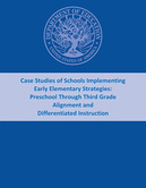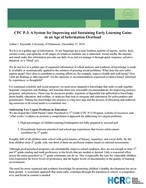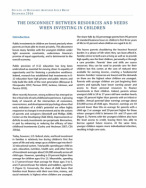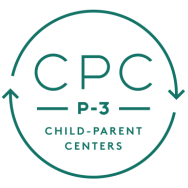CPC-P3 Findings
 CPC P-3 programs in St. Paul, MN, and Chicago were recently featured as case studies for effective approaches to alignment and differentiated instruction in the Department of Education’s report “Case Studies of Schools Implementing Early Elementary Strategies: Preschool Through Third Grade Alignment and Differentiated Instruction.”
CPC P-3 programs in St. Paul, MN, and Chicago were recently featured as case studies for effective approaches to alignment and differentiated instruction in the Department of Education’s report “Case Studies of Schools Implementing Early Elementary Strategies: Preschool Through Third Grade Alignment and Differentiated Instruction.”
 HCRC Co-Director Arthur Reynolds recently published “CPC P-3: A System for Improving and Sustaining Early Learning Gains in an Age of Information Overload.”
HCRC Co-Director Arthur Reynolds recently published “CPC P-3: A System for Improving and Sustaining Early Learning Gains in an Age of Information Overload.” The Council of Economic Advisers recently released an issue brief that highlights the challenges many American families face in providing high-quality care and education experiences for their young children. Research from HCRC Co-Director Arthur Reynolds is featured in “The Disconnect Between Resources and Needs When Investing in Children.”
The Council of Economic Advisers recently released an issue brief that highlights the challenges many American families face in providing high-quality care and education experiences for their young children. Research from HCRC Co-Director Arthur Reynolds is featured in “The Disconnect Between Resources and Needs When Investing in Children.”Impacts of CPC
Three- and four-year-olds participating in full-day preschool in the Child-Parent Center Education Program performed significantly better than their part-day counterparts in 3rd grade reading and math achievement. They also had significantly lower rates of grade repetition. Although short-term gains of full-day programs are well-documented, evidence on long-term gains are mixed. This study of a renowned program addresses the benefits of high-quality early learning experiences. To learn more:
Read recent news coverage on this study in Education Week and Parents Magazine.
Read the full pre-print publication report and supplement here.
- Association of a Full-Day vs Part-Day Preschool Intervention With School Readiness, Attendance, and Parent Involvement
In an expansion of the CPCs in Chicago, a full-day preschool intervention was associated with increased school readiness skills in 4 of 6 domains, attendance, and reduced chronic absences compared with a part-day program.
- Multi-Site Expansion of an Early Childhood Intervention and School Readiness
The findings from this report show that expansion of the Child-Parent Center program to new schools and more diverse populations is feasible and effective in promoting school readiness skills and parental involvement.
Financing and Stability
- Using Benefit-Cost Analysis to Scale Up Early Childhood Programs through Pay-for-Success Financing
This paper describes social impact borrowing as a new method for financing public services, outlines the contribution of BCA, and discusses the innovative use of social impact financing to promote scaling evidence-based Child-Parent Centers and other early childhood programs.
Predictors of Well-Being
- Adverse Childhood Experiences and Adult Well-Being in a Low-income, Urban Cohort
This study tests the association between adverse childhood experiences (ACEs) and multidimensional well-being in early adulthood for a low-income, urban cohort, and whether a preschool preventive intervention moderates this association.
Program Elements
- Strategies for Scaling Up: Promoting Parent Involvement through Family-School-Community Partnerships
Flexibility, creativity, and collaboration are required to successfully meet the needs of each school when scaling up family engagement programs across a diverse range of communities.
- Not Just Academics: Paths of Longitudinal Effects From Parent Involvement to Substance Abuse in Emerging Adulthood
CPC participation initiates a pathway to increased parent involvement and expectations, which positively impact adolescents’ competencies and problem behaviors, lowering rates of substance abuse.
